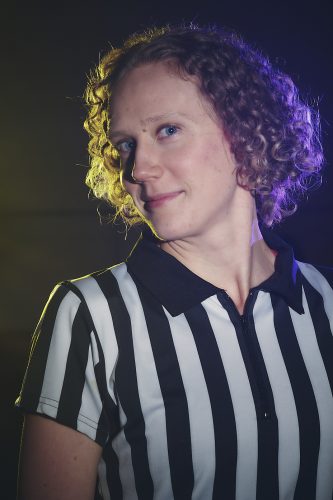Every season we like to introduce you to some of our rookies. We’re starting off with our Officials crew. We asked them about what brought them to NSRD and what it’s like to be a Zebra.

What was it like NSOing your first bout/scrimmage? Were you nervous?
I was nervous, but in a good way. The energy of the crowd helped at the first bout, and all of the more experienced NSOs were fantastic about sharing knowledge and tips. I’m looking forward to the next one!
What’s the toughest part of NSOing?
Keeping all the paperwork straight/staying focused on whatever part of the bout is my responsibility to record. The action on the track is often alluring and easy to get lost in.
What’s the most fun/rewarding?
Other than finding a new contingent of people who enjoy craft beer and good whiskey as much as I do? The chance to learn more about both the game and the league. The amount of effort and heart that goes into NSRD continually makes me grateful to be a part of the league.
What’s your favorite NSO position, and why?
I love running the scoreboard. The dais is a good view, it’s a fun job to pay attention to everything, and I always end up learning a lot!
What would you like folks to know about being an NSO?
Being an NSO has allowed me to get more involved with the league and learn so much more about derby in general. Since I’ve got medical issues that keep contact sports from being a good fit for me, NSOing allows me to be part of the league in a deeper way than I could be otherwise. It’s a great time and I’m so glad to have been drafted onto #teamladyref!
What was the funniest/ best experience you’ve had NSOing so far?
Getting our team photo taken at Twin Spirits Distillery was a blast! The Halloween scrimmage was great too, lots of fantastic and horrifying costumes.
Why volunteer with NSRD when there are so many excellent non-profits out there that need help?
There’s a saying that roller derby looks like women knocking each other down but it’s really women building each other up. If this statement is modified to include non-binary and femme identified individuals, as NSRD is proud to, I think that idea describes us fairly well. In our brightest moments, NSRD is a truly strong community of all kinds of people, not just a group of competitors.

What drew you to roller derby? How did you find out about NSRD?
A retired MMRD skater friend of mine (Rolocop) kept telling me about how awesome roller derby was. He took me skating at Roller Garden (which I LOVED), and then eventually to my first NSRD bout. I grabbed a flyer for Satellites at that bout, and after weeks of mental debate over whether I should or shouldn’t, I finally decided to sign up and join the world of derby. Best decision I ever made.
What’s the toughest part of being a skate ref? The most fun or rewarding?
Toughest part: Knowing where to look and when, and what constitutes sufficient impact to turn an illegal action into a penalizable action. Also, sometimes I get into a slump of fear of calling penalties, and I second guess absolutely everything and call nothing.
Most fun/rewarding: Skating! I’m a nerd that loves skating!
What’s your favorite skate ref position and why?
Jam ref! I like being more active, and I like having one focal point versus hoping you’re looking in the right place at the right time to see penalties.
How was reffing your first scrimmage/bout? Were you nervous?
My first scrimmage was the rookie scrimmage for summer boot camp. Since there were spectators, I was a bit nervous. Once it started though, it felt pretty much like the scrimmage scenarios we had run in practices. It went decently well, except that one time I started following the wrong jammer (but even experienced refs have done that).
What was the first penalty you called?
Most definitely a cut. They’re the most clear-cut penalty (pun not necessarily intended, but not fully unintended either).
What would you like folks to know about being a skate ref?
It’s fun, but it’s tough. We’re human, and therefore fallible. We try our best to see everything, but sometimes we miss things. Sometimes what we see is different from what an outsider sees or what a skater experiences on the track, but we remain objective and make calls based on what we observe. It’s the best we can do. Also, never argue with a ref. You will gain nothing from it, except perhaps a misconduct penalty.
